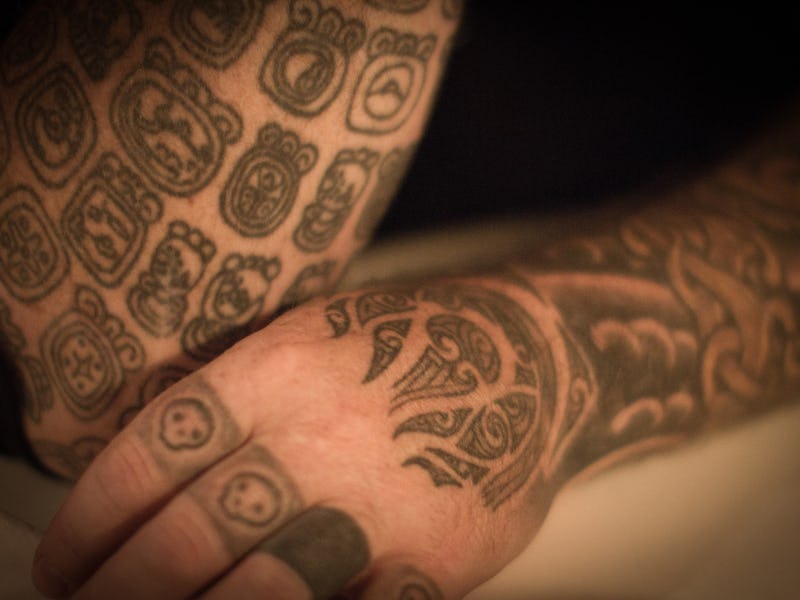The Science of Tattoo Removal Cream Just Left the World of Wishful Thinking
Your immune system holds the key to making tattoos permanent -- and also to erasing them.

Tattoos are supposed to be permanent — that’s kind of their whole thing. But maybe not for long. A Canadian Ph.D. student has invented a topical cream that he says can cheaply and easily remove unwanted tattoos. He’s just sold the idea to a pharmaceutical company that specializes in dermatology for an unnamed amount (but enough to make a Ph.D. student giddy). Alec Falkenham says his product can remove tattoos cheaply, quickly, and painlessly. If he’s right, his innovation will destroy the laser tattoo removal market and overhaul our cultural relationship to inked skin.
There are many (unregulated) tattoo removal creams on the market today, and they’re basically all crap. They target the top layer of skin with abrasion and chemicals, which is mostly useless because your tattoo ink sits within the deeper layers of skin. If they manage to fade the tattoo at all, it’s likely because of the increased immune response in the area as your body fights the damage being done to your outer layer of skin. Ouch.
To understand why tattoos are so difficult to remove, you need to understand how they get there in the first place. Needles filled with ink pierce your skin many thousands of times, injecting the pigment into your skin. Your body instantly reacts to this assault, and sends out its repair agents to heal your wound. Ironically, it’s actually this immune response that allows the tattoo to become permanent.
Special white blood cells, called macrophages, come into the area to clean up the debris. After gobbling up the pigment, some of these cells make it back to your lymph nodes, where the junk is processed and expelled. But some of these cells get stuck, still full of ink, in the gel-like matrix under the top layer of skin. Because the pigment has been consumed by your cells, your body no longer considers it a foreign object and stops fighting to get rid of it. So it just hangs out there, visibly flooding your inner skin with color.
The best technology humans have previously come up with to disrupt the permanence of the tattoo is the laser. Lasers work by targeting pigments at a specific frequency, which blasts them into smaller pieces, making it easier for your immune system to digest them naturally. Laser tattoo removal has gotten a lot better over the years, but it’s still pretty hard to do. Different colors of pigment have to be targeted separately, and some are harder to remove than others. A single session of laser removal can cost $100 or more, and it usually takes several sessions, sometimes 10 or more, over many months to get rid of the tattoo completely. Even then, some scarring or discoloration will often remain.
Falkenham’s product is different. It’s a chemical compound that he had been studying in his research on healing heart tissue, until he wondered what it might do to a tattoo. The active ingredient, called bisphosphonate liposomal, penetrates the skin and selectively targets macrophages, leaving other cells in the area unharmed. When these cells die, other macrophages come in to clean up the debris and replace the dead cells, ultimately removing the tattoo ink. The product has only been tested on pigs and mice so far, but Falkenham told CBC News that he’s seen complete tattoo removal in a week. He told Buzzfeed that he expects treatment of a three-inch-square area to cost about $4.50.
At this point, it’s up to Cipher Pharmaceuticals to run clinical trials to prove that the product works and doesn’t have any terrible side effects, and then market it for sale. The company shouldn’t have any trouble signing people up as guinea pigs; Nearly a quarter of American adults are tattooed, and of those about one-in-eight regret at least one.
If the product works as well as Falkenham claims, it’s going to change the very idea of tattoos themselves. Parents everywhere will breathe easier, knowing their son’s new tattoo of his girlfriend’s name won’t be there forever, but the notion of a tattoo as a lifelong commitment will evaporate. Tattoos have always been defined by the fact that they’re much easier to get than to get rid of; soon, the opposite will be true. That’s kind of a sad thing, given that humans have used tattoos as artistic and cultural markers for many thousands of years. Maybe it’s a sign of the times — of our ADHD social media culture. Or maybe it’s just a sign of change, neither good nor bad, into a world where experimenting with skin art is easily done, and undone.